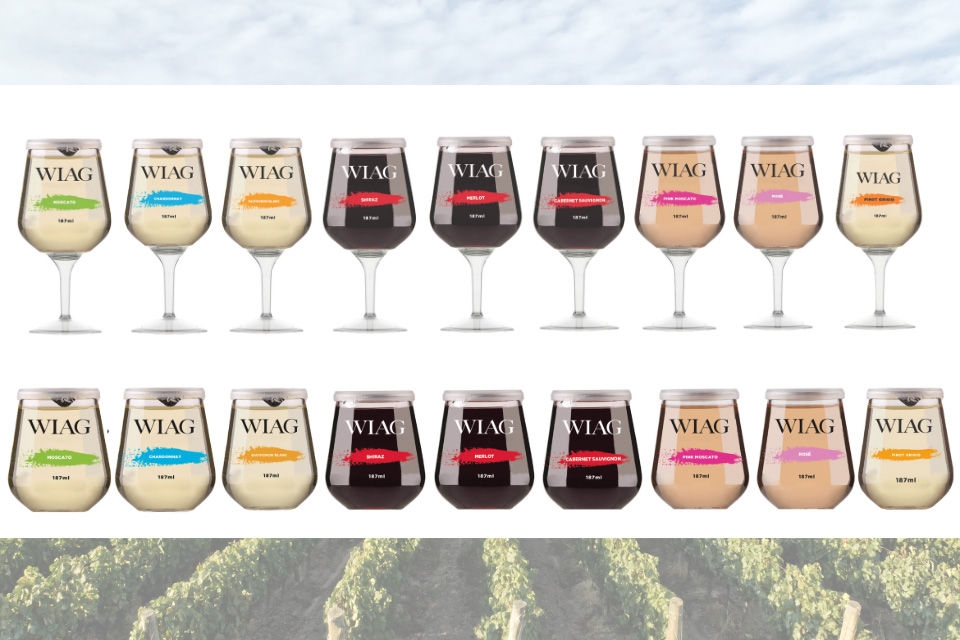As a mum of four living on the rural border of Victoria and New South Wales, Michelle Anderson-Sims never considered a career running a wine company, let alone one that exports to more than 20 countries. That is, until she saw an article, by chance, in a discarded newspaper on a London Underground train.
It was a profile of a British entrepreneur selling single servings of wine in pre-filled plastic glasses. Michelle immediately saw a gap in the Australian market.
After some long nights of research, a couple of false starts, and an unsuccessful collab with that same British entrepreneur, she launched Wine In A Glass Global.
‘Long story short, I bought a filling line in-country and started producing Australian wine in a cup,’ says Anderson-Sims.
‘The end product is 100% Australian-made.’
A not-so-niche product
The Wine In A Glass (WIAG) product comes vacuum-sealed, with a replaceable lid; and the plastic glasses are shatter-proof, reusable and recyclable — even eligible for refunds under some container deposit schemes.
‘Some people have a misconception that it’s a niche product,’ Anderson-Sims says. ‘But we’ve found, purely through demand, that there are multiple channels to market.’
WIAG counts rail companies, ferries and airlines among its customers, plus offshore workplaces and mining sites. It’s on sale in cinemas and pool resorts; at sports clubs and music venues — anywhere where drinks are allowed, but glass is not.
It’s also popular in hospitals and aged care facilities, and is even certified as accessible for people with arthritis in their hands.
Growth in trying times
WIAG has been up and running since 2013, but Michelle says business ramped up during the COVID-19 pandemic — largely due to a sudden necessity to diversify.
Pre-2020, the business largely relied on a handful of overseas clients in South Korea, Japan and China. Things were “slow to pick up” domestically, but WIAG was sold at events and festivals throughout Australia.
Between the bushfires of 2019-20 and the COVID-19 lockdowns, most of those events were cancelled, and the stock returned.
‘The domestic market collapsed,’ Anderson-Sims recalls. ‘But I have a great team — I love coming to work because I work with such good people — so I needed to look after them.’
The founder doubled down on marketing overseas, and with support from Austrade, started building relationships with stockists and brands globally. Soon, the orders started flowing in.

Wine In A Glass offers quality wine in shatter-proof, reusable and recyclable glasses.
A global success story
Today, exports make up about 95% of revenue. To keep up with demand, the business has moved to a larger space in Epping, Melbourne.
South Korea remains the biggest market — WIAG is on the shelves of Costco and Lotte Group supermarkets and is the number one single-serve wine in the country.
Throughout Southeast Asia, the glasses grace the shelves of some of the biggest retailers, including Aeon in Malaysia, Don Revi in the Philippines and 7/11 and Neo Group in Singapore.
WIAG also has a growing presence in India and Africa, and exports to Europe, South America and several Pacific nations, including New Zealand.
However, importing requirements can be particularly strict for consumable (and alcoholic) products. Every market has unique labelling rules, and specific requirements around certification and documentation. There is no one-size-fits-all playbook.
A toolkit for going global
It’s here that Austrade, and its Go Global Toolkit, have been particularly valuable.
‘Tools like the Go Global Toolkit have been instrumental in helping us complete the initial processes and understand importing requirements for different countries,’ Anderson-Sims says.
‘There’s nothing worse than getting a container of product to a country and realising you haven’t got the right mandatories in place,’ she adds.
‘You really need to make sure customs are satisfied at the destination, or you risk having your container returned, at your expense.’
Throughout her exporting journey, Anderson-Sims has used the Go Global Toolkit’s Market Search tool to identify new opportunities; and the Export Rules Finder tool to understand regulations for specific markets, and access tailored advice and government resources.
‘Rather than reinvent the wheel, I leveraged the templates, checklists, and market insights to fast-track decision-making and avoid costly trial-and-error,’ she says.
‘It wasn’t just about gathering information — it was about applying it into real, commercially viable moves. I treated the Toolkit as a business enabler, not just a research exercise. It’s helped us to operate more professionally, and lifted the level of competence within the business.’
Good for business, good for Australia
Particularly in Southeast Asia, Anderson-Sims says Australian wine is synonymous with quality. The convenience and the novelty of the single-serve cup is one selling point. The other is the credibility of Australian-made.
Initially, she worked with boutique wineries, targeting “exceptional” wines at a higher price point. However, she quickly realised this wasn’t what the market wanted.
‘Caterers were looking for easy-drinking wine, but still a quality wine,’ she explains. ‘We knew we would fail if we had bad wine in that cup.’
WIAG now works with 2 carefully selected wineries. Wine is delivered to the Epping manufacturing facility, where it’s packaged, labelled and shipped.
‘We’ve been able to increase Australian manufacturing, and those materials are now being exported with the finished product. The brand has become a globally recognised, quality product, and we’re very proud of that.’
According to Anderson-Sims, it’s possible WIAG wouldn’t have had the international success it has without Austrade support.
‘Austrade has always had faith in the product, the business, myself and my team,’ she says. ‘That’s been reciprocated with great outcomes for everybody, and for Australian trade as well.’
Go further, faster with Austrade
Austrade’s Go Global Toolkit helps you learn the export basics, find the right markets and understand market requirements.